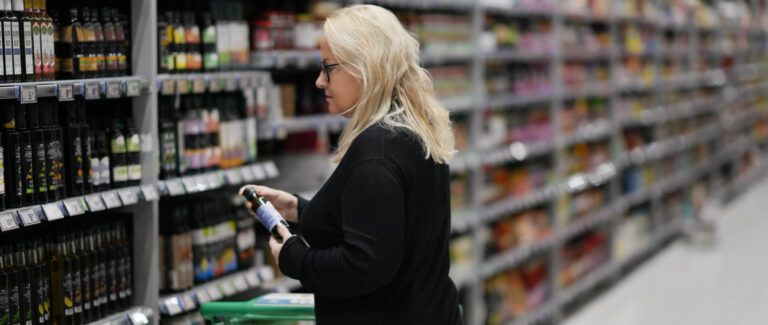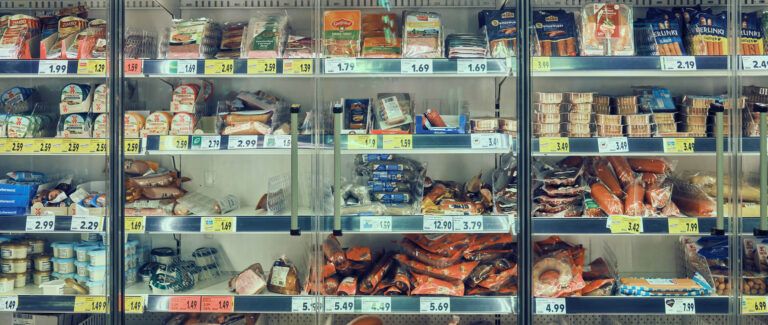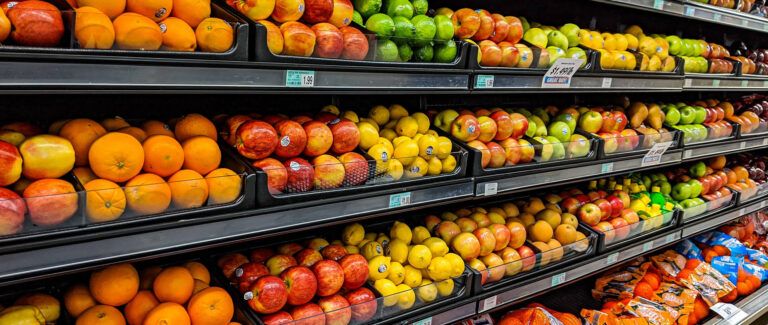For years, RELEX has helped food retailers, wholesalers, and manufacturers reduce food waste through more accurate forecasting and inventory optimization. As a leader in our industry, our goal is to help our customers make a significant positive impact on their sustainability. We’re always working on new ways to help our customers reduce their carbon footprints.
The RELEX platform already increases planning accuracy and optimizes deliveries, leading to more efficient use of transport capacity and reduced transport emissions. But the most jaw-dropping results so far have come from reducing food waste.
Our grocery customers have consistently seen a reduction in food waste from 10% to 40% annually after they switch to RELEX. That’s significant because food waste accounts for 8–10% of greenhouse gas emissions.
While we know that food waste reduction translates to reduced carbon output, we wanted to understand the impact in more detail, so we analyzed customer results and what we found was astounding.
Helping customers reduce waste and emissions
In 2023 we prevented approximately 228 million kg of food waste for our customers. That translates to 950,000 tons of CO2 equivalents. To put it another way: That’s like taking about 200,000 cars off the road in a single year. As the number of food companies using RELEX grows, our positive impact on the climate also continues to grow. But that is just the beginning.
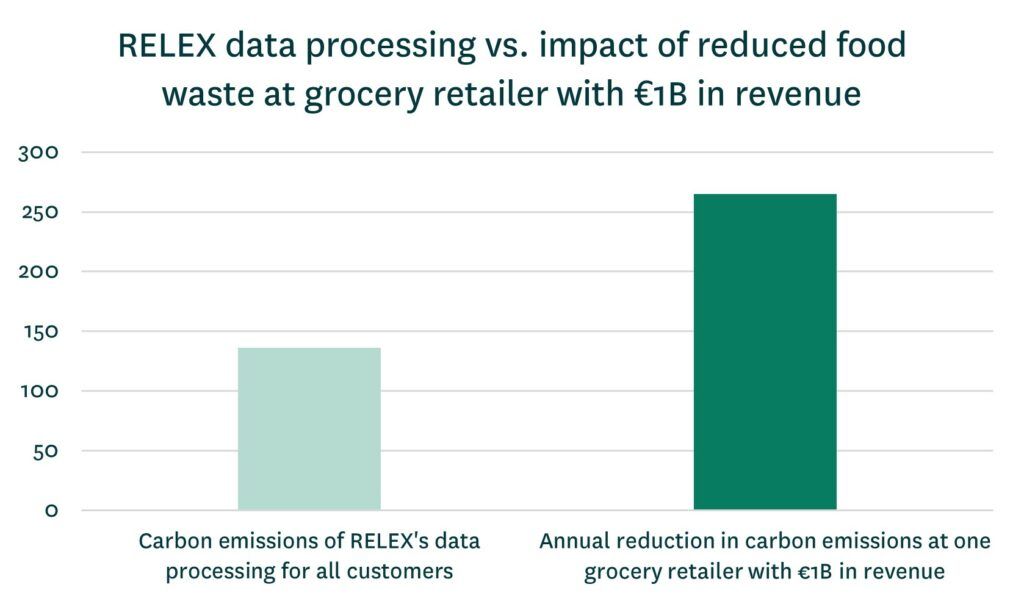
Every year, we continue to develop new ways to help our customers be more sustainable. In 2024, we’ve launched a new tool to make it easier to accurately gauge carbon footprint.
The CO2 analytics tool is an easy way for our customers to track their emissions as part of their day-to-day experience using RELEX. On the same platform where our customers can easily track product availability and spoilage, this tool can now identify and track CO2 emission factors.
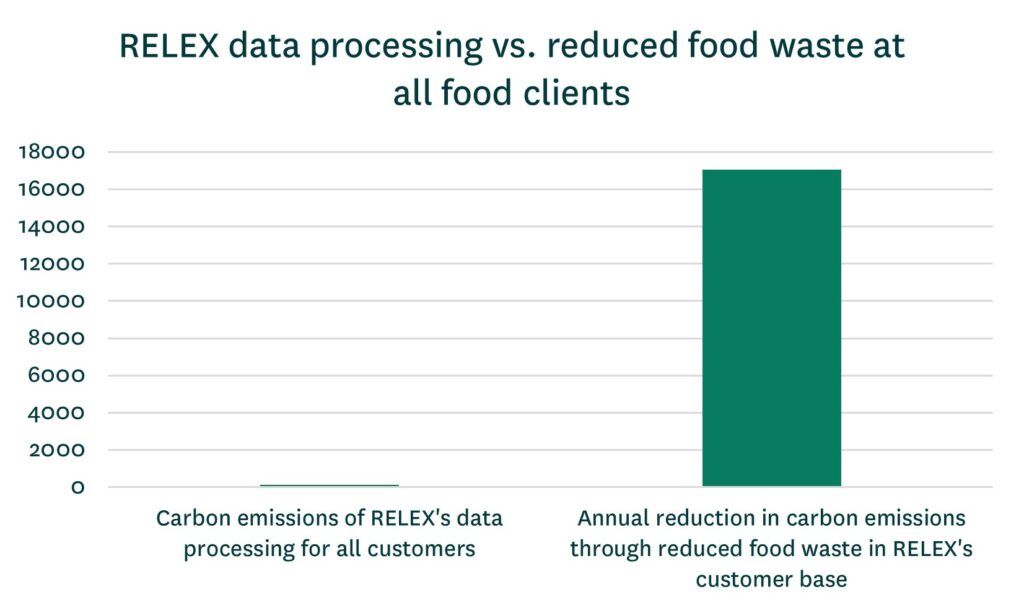
Coming soon, customers will also be able to add CO2 emissions data directly to their product information within the RELEX platform. With this functionality, AI algorithms automatically match product information in any language with emission data, simplifying ESG reporting. So even if you don’t know your emissions factors, RELEX will help you identify them.
Case study: A French convenience store cuts food waste by 30%
Using data-driven solutions for improving sustainability can be transformative. Just reducing spoilage in short-shelf-life products while reducing stock outs has significant impacts on lowering waste.
Franprix, a prominent French convenience retailer with a network of 900 stores, serves fresh foods to customers daily, including meat, fish, salads, sandwiches, bread, and dairy products. Franprix tackled the challenge of optimizing product replenishment by turning to RELEX, leveraging store-level demand data to streamline inventory management and minimize waste while maximizing customer satisfaction.
Using an automated approach, Franprix aimed to strike a balance between ensuring product freshness and minimizing waste. Their adoption of RELEX yielded significant improvements: A 30% decrease in product spoilage while also achieving 67% reduction in stockouts.
Franprix is a great example of how data-driven solutions can optimize retail inventory management. By improving operations efficiency, they can give their customers the freshest, highest quality products while reducing environmental impact.
Reducing our own carbon footprint
Having such a significant impact by reducing our customers’ carbon footprints does not mean we can overlook the sustainability impact of our own operations. We constantly review our internal operations to see where improvements can be made to further reduce our carbon footprint at RELEX.
Since 2021 we have been calculating and reporting our own emissions and offsetting them through high quality carbon offset projects. At the same time, we take active measures to reduce our carbon footprint.
Last year, we collaborated across departments to compound our impact at RELEX. Our focus was reducing emissions at RELEX, particularly by cutting back on air travel and making careful choices about food, while also developing tools like an event emissions calculator to guide sustainable decision-making.
To combat the carbon footprint of air travel, we encourage remote meetings and local team-building events that don’t call for long-distance air travel. We also shifted towards vegetarian options at events and away from beef-centric menus, given the significant disparity in CO2 emissions among food choices.
Our commitment to sustainability extends beyond events; we also promote eco-friendly commuting and support remote work to reduce greenhouse gas emissions. Once you’re at the office, our initiatives prioritize office waste reduction, recycling, and electronic equipment reuse. And finally, renewable energy powers our data centers and offices, minimizing our energy-related emissions.
Innovating for a sustainable future
Sustainability is more than a checkbox for RELEX; it’s an integral part of our mission, guiding our decisions and actions towards a more environmentally friendly future.
At RELEX, we know it’s critical not only to support our customers as they improve their sustainability and reduce their carbon footprint but also to practice what we preach. Our overarching goal is always to make the best business decisions possible for our clients, our employees, and the planet.
Our annual ESG report set targets to continuously make improvements in high-impact areas. Take a look at our latest ESG report to learn more about how we’re actively working towards a greener future, both for ourselves and for the businesses we support.


